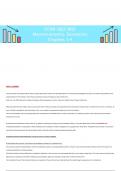ECON 1012/1013
Macroeconomics Summaries
Chapters 1-4
DISCLAIMER:
These summaries are prepared with the intent to closely align with the content of the specified textbook. Full credit and acknowledgment are given to the authors and publishers of the
original textbook for the material on which these summaries are based. All images are taken directly from:
Parkin, M. et al. (2020) Economics: Global and Southern African perspectives. 3rd edn. Cape Town, Western Cape: Pearson South Africa.
While every effort has been made to ensure accuracy, the author of these summaries cannot guarantee that the information contained herein is entirely free from errors or omissions. As
such, no liability is accepted for any inaccuracies, errors, or any resultant consequences arising from the use of this material.
Users are encouraged to refer to the original textbook for comprehensive understanding and to verify any information. Any reliance you place on the content of these summaries is
strictly at your own risk.
Be advised that the distribution of these notes via any platform, including but not limited to email, WhatsApp, AirDrop, or any other digital means, leaves an identifiable trail.
Unauthorized distribution or reproduction of these materials may be considered a violation of plagiarism and copyright laws in South Africa. Perpetrators found involved in such actions
are liable to be prosecuted under the relevant legal provisions. Exercise caution and respect intellectual property rights.
Unauthorised dissemination/distribution of this document is strictly prohibited.
By downloading this document, the purchaser acknowledges and agrees to the following terms:
The purchaser accepts full responsibility to refrain from distributing, sharing, or reproducing this document, in whole or in part, without the express written consent of the author. Any
unauthorized distribution is strictly prohibited.
Should the purchaser be found distributing or enabling the distribution of this document, they acknowledge that they may be subject to legal action. The author reserves the right to take
legal recourse, including but not limited to initiating court proceedings, against any individual or entity found in violation of these terms.
Your download and use of this document indicate your acceptance of these terms and your understanding of the potential legal consequences of non-compliance.
, PART 1 :
CHAPTER 1
SOCIAL SCIENCE THAT STUDIES THE CHOICES THAT INDIVIDUALS BUSINESSES GOVERNMENTS + ENTIRE SOCIETIES MAKE AS THEY COPE
WHAT
, ,
WITH SCARLITY + THE INCENTIVES THAT INFLUENCE +RECONCILE THOSE CHOICES
IS ECONOMICS :
·
STUDY Of CHOICES + THEIR CONSEQUENCES
WE WANT MORE THAN WE CAN GET
·
:: INABILITY TO GET EVERYTHING WE WANT =
SCARCITY
·
INCENTIVES RECONCILE CHOICES
A REWARD THAN ENCOURAGES AN ACTION/ PENALTY THAT DISCOURAGES ONE
·
TWO PARTS MICROECONOMICS :
STUDY Of CHOICES THAT INDIVIDUALS+ BUSINESSES MAKE
MACROECONOMICS :
STUDY OF THE PERFORMANCE Of THE NATIONAL ECONOMY + GLOBAL ECONOMY
TWO BIG ECONOMIC QUESTIONS
·
HOW DO CHOICES END UP PETERMINING WHAT HOW FOR WHOM GOODS + SERVICES
,
ARE PRODUCED
DO CHOICES MADE IN PURSUIT OF SELF-INTEREST ALSO PROMOTE SOCIAL INTEREST
·
WHAT , HOW FOR WHOM
-
GOODS + SERVICES ARE OBJECTS PEOPLE VALUE + PRODUCE TO SATISFY WANTS
-
WHAT PRODUCE VARIES ACROSS COUNTRIES + Us OVER TIME
FACTORS OF PRODUCTION
HOW PRODUCE RESOURCES USED
-
IS DESCRIBED BY TECHNOLOGIES + TO PRODUCE GOODS + SERVICES
RENT > LAND = 'GIfTS Of NATURE' :.. NATURAL RESOURCES
KNOWLEDGE + SKILL OBTAINED
>
WAGES LABOR =
WORK TIME + EFFORT BY PEOPLE : QUALITY DEPENDS ON HUMAN CAPITAL
INTEREST >CAPITAL = TOOLS , INSTRUMENTS MACHINES BUILDINGS
, ,
OTHER CONSTRUCTIONS
> ENTREPRENEURSHIP
PROFIT HUMAN RESOURCE THAT ORGANISES LAND, LABOUR CAPITAL
=
+
1
FOR WHOM
-
IS WHO CONSUMES GOODS +
SERVICES PRODUCED :
DEPENDS ON INCOME
INCOME CAN BE EARNED TUROUGH SELLING SERVICES OF FACTORS Of PRODUCTION :
SELF-INTEREST
·
US SOCIAL INTEREST
-
SELF-INTEREST :
BEST CHOICE AVAILABLE TO YOU
-
OUTCOME IS IN SOCIAL INTEREST If BEST FOR SOCIETY AS A WHOLE
-
SOCIAL INTEREST REQUIRES
:
EFFICIENCY DESCRIBES SITUATION THAT CANNOT BE IMPROVED + FAIR
SHARES
-
SOCIAL INTEREST ISSUES:
GLOBALIZATION
2
INFORMATION REVOLUTION
3
CLIMATE CHANGE
4
FINANCIAL INSTABILITY
5
UNEMPLOYMENT
6
WATER POWER+ FOOD SHORTAGES
,
·
ECONOMIC WAY Of THINKING
-
A CHOICE IS A TRADE Off
SCARCITY LEADS TO MAKING CHOICES
·
:: SELECT FROM AVAILABLE ALTERNATIVES
TRADEOFF EXCHANGE GIVE UP GET ANOTHER
·
IS AN : ONE THING TO
MAKING RATIONAL CHOICES
-
BY COMPARING BENEFITS +COSTS : ACHIEVE GREATEST BENEFIT OVER COST




